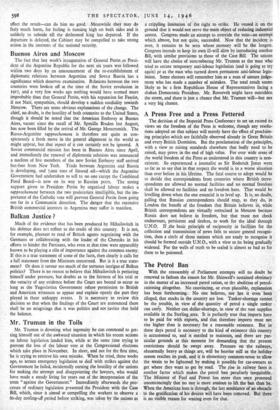The Petrol Ban
With the reassembly of Parliament attempts will no doubt be renewed to fathom the reason for Mr. Shinwell's sustained obstinacy in the matter of an increased petrol ration, or the. abolition of petrol- rationing altogether. No convincing, or even plausible, explanation has been forthcon'Jng. No one believes, nor has it even been alleged, that stocks in the country are low. Tanker-shortage cannot be the trouble, in view of the quantity of petrol a single tanker can carry. Neither can dollar-shortage, in view of the vast supplies available in the Sterling area. It is perfectly true that imports have to be paid for with exports, and that therefore imports must not rise higher than is necessary for a reasonable existence. But in these days petrol is necessary to the kind of existence this country is accustomed to, and is entitled to maintain, and there are par- ticular grounds at this moment for demanding that the present restrictions should be swept away. Pressure on -the railways, abnormally heavy as things are, will be heavier still as the holiday season reaches its peak, and it is elementary common-sense to allow the strain to be lightened by making it possible for car-owners to get where they want to get by road. The rise in railway fares is another factor which makes the petrol ban peculiarly inequitable. The Minister of Fuel and Power has more than once protested unconvincingly that no one is more anxious to lift the ban than he. When the American loan is through, the last semblance of an obstacle to the gratification of his desires will have been removed. But there is no visible reason for waiting even for that.






























 Previous page
Previous page